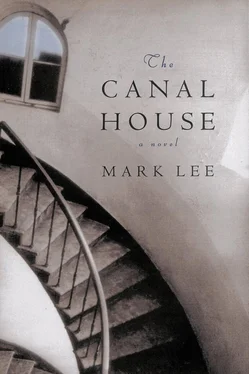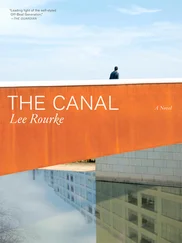The little nun at the convent recognized me from the time I visited Daniel. I told her that I wanted to see the mother superior and she led me up a stone staircase to an office that overlooked the garden.
The mother superior was a large woman with a broad face. She looked like someone who owned an Italian corsetry shop. She listened intently as I described what had happened in East Timor. When I told her that Daniel was dead, she looked startled and sat back in her chair.
“We prayed for Mr. McFarland’s safe return.”
“I guess it didn’t work.”
“Excuse me. I must tell the others.”
The mother superior stood up suddenly and left me alone in her office. I sat there for a few minutes and listened to footsteps moving up and down the hallway. Staring at a faded photograph of a dead pope, I had a vision of an enormous prayer machine hidden down in the convent basement. It had pedals and lights and looked like a cross between a slot machine and an old-fashioned concert organ. Now they were removing Daniel’s soul from the device, the little tag that listed his name.
When the mother superior returned she was very brisk and efficient. She questioned me about Daniel’s funeral and seemed relieved that he had been buried in a Christian cemetery. I took Daniel’s improvised will out of my shirt pocket and placed it on her desk. The nun unfolded the crunched-up sheet of notepaper and studied it as if it was a fragment of the Dead Sea Scrolls.
“He wanted you to have his car,” she said.
“Yes. Is it still here at the convent? Will the engine start or do I need to get a mechanic?”
“A mechanic is not necessary. When Mr. McFarland left Rome, he gave me the key and asked me to check the car occasionally. This became a source of tension among us until I decided that we would all take turns, oldest to youngest. Every night, after dinner, one of the sisters got to sit in the car and run the engine for a few minutes to keep the battery alive.”
“Thank you.”
“We would have done anything to help Mr. McFarland. Everyone here respected him. He was a very generous man.”
“That didn’t help him either.”
“I don’t understand what you’re saying, Mr. Bettencourt.”
“The fact that you prayed for him and the fact that he was a good person didn’t stop this from happening.”
The nun folded up the will and handed it back to me. “I’m sorry you lost your friend,” she said. “It must be very painful.”
THE CAR STARTED the first time and I drove north to Bracciano. The autumn rains hadn’t arrived and the days were still warm. A herd of goats scrambled through the road ditch. Farmers were burning the stubble off their fields and there was a smoky odor in the air.
I opened the gate near the cottage, then drove slowly down the dirt driveway. La Signora was digging up onions in the vegetable garden. When she saw me, she thrust her shovel into the dirt and walked down the terraces to the patch of gravel where Daniel had always parked the car.
“Buon giorno, Signor Nicky.”
“Buon giorno, signora.”
The old lady touched the red hood of Daniel’s car, then started crying. She said a few things in Italian that I didn’t understand.
“Dov’è Signora Julia?” I asked, and my question transformed the old lady. She stopped crying. If Billy Monroe or any other threat had dropped out of the sky, she would have chased them away with her shovel.
La Signora pointed down the slope to the ravine, and when I hesitated she gave me a little push forward. As I crossed the field to the dirt pathway, I inspected the cherry trees I had planted last year. All of them had lost their summer leaves, but their trunks were straight and their branches reached toward the sky. The Monterey pines Daniel had planted still looked like saplings, but the eucalyptus had taken root and were peeling off strips of bark like a snake shedding its skin.
Julia sat on a boulder, facing the ruins of the Roman bridge. She wore a long cotton skirt and a wide-brimmed straw hat to protect her from the sun. When I came closer through the grass I saw that she had walked down the hill to pick blackberries, but the basket was only half full.
She stood up when I approached and we both looked at each other. Just my presence there reminded her of Daniel and I could see that she was struggling to control her grief. I felt damned forever, responsible for what had happened.
“Good to see you, Nicky.” Her voice was strained, but she wasn’t going to cry.
“Maybe I should come back later.”
“No. I’m glad you’re here. I left messages at your hotel in London.”
We sat down on two chunks of marble while a hawk drifted across the sky. “Tell me what happened after I left Timor,” she said. “Even the smallest thing.”
I told her about Daniel’s funeral and the crowd at the cemetery. I told her that Jenkins and his men had tracked down the militia and that Daniel’s wristwatch and passport were in the car. I didn’t mention Richard’s betrayal. Some other time, I thought. Not this afternoon.
“And what happened to you?” I asked. “Did Richard take you to Westgate Castle?”
“No. They put me in a private hospital in West London. It was the sort of place where the staff wears pink T-shirts and you call the doctors by their first names. I saw a cabinet minister and a rock star shuffling down the hallway in their pajamas.”
“What did they do to you?”
“Drugged me for a week or so, then brought me out of it. A psychiatrist came into my room twice a day and we had these bizarre conversations. He kept asking me to visualize my grief. Was it an animal? What kind of animal? Nonsense like that. When I told him to go to hell, they changed my medication.”
“Could you leave?”
“No. It was a lockdown facility and I had actually signed myself in. After another week of being in a haze, I faked swallowing the pills and became a bit more coherent. I borrowed ten pounds from the woman who served the meal trays and slipped out the back entrance. Then I took a cab to Laura’s apartment, borrowed some more money, and flew to Italy. I kept crying the whole time, in the airport lounge, in the women’s room, in the back of the taxicab. When I finally got here, La Signora put me to bed and I slept for two days. She’s been wonderful.”
Julia bent down and picked up a smooth white pebble. She rubbed the surface with her thumb, then tossed it away. “I’m going to stay in Bracciano. I’m not going to leave. I feel like Daniel is here. Sometimes he’s right beside me. Sometimes he’s in the house or up in the orchard. And there’s another thing, too.” She looked up at me and smiled for the first time. “I’m pregnant, Nicky. La Signora seemed to know before I did. I think she’s a bit of a sorceress.”
“That’s wonderful, Julia. Congratulations. Daniel would be very happy.”
“I plan to have the baby here. I’ll run out of money in a few months, but I’ve applied for a special certificate to practice medicine in Italy. They need a doctor in the village so everyone is fairly positive about the idea.”
We were both silent for a moment and I thought about the child. Then we looked at each other and we both remembered Daniel and the pain came again.
“I better go.”
“Please don’t, Nicky. I’m glad you’re here.”
“We remind each other of what happened.”
“And it did happen. When I was in the hospital, I pretended that he wasn’t dead, but of course that’s not true. We were all on that beach together. Cristiano was going to kill everyone there and Daniel saved our lives. No matter what happened afterward, he made the right decision at that moment. I don’t think he’d take it back.”
Читать дальше












